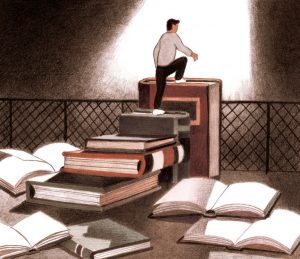“Donald Trump doesn’t want you to go,” the title goes on, reminding us that it is actually not going where he wants some to go that is the real problem for those people. Hisham Matar at the New York Times shares an imaginative column with us in which he describes reading as getting to know others by knowing oneself. It’s an old maxim, often having to do with truth: “be true to yourself and you’ll be true to others,” found in Shakespeare, Virginia Woolf, and Matar:
All great art allows us this: a glimpse across the limits of our self. These occurrences arent merely amusing or disorientating or interesting experiments in virtual reality. They are moments of genuine expansion. They are at the heart of our humanity. Our future depends on them. We couldnt have gotten here without them.
Just as a river leads to the sea and from Jane Austens vernacular social order to William Faulkners American South, from Naguib Mahfouzs Cairo to Tayeb Salihs village in Sudan the particular in great literature has always flowed to the universal.
That is perhaps what the author of the iconic novel The House of Hunger, the Zimbabwean writer Dambudzo Marechera, meant when he said, If you are a writer for a specific nation or a specific race, then he had no use for you. What he was resisting was narrow provincialism, the sort of identitarianism that has invaded our academies and public discourse, and which sees individual life as, first and foremost, representative of a racial, religious or cultural category.
In his review, Matar, at one with himself, manages to reach us also by expressing atruth about literature and politics that is urgently in need of recognition: diversity is about unity and not division.
Know thyself at The New York Times

